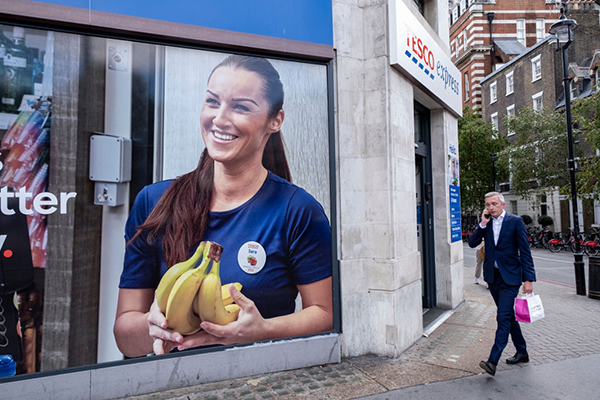Why new Tesco share price upgrade is justified
A week after publishing half-year results, one analyst thinks the country’s biggest grocer is on the cusp of a major milestone. City writer Graeme Evans has the details.
7th October 2025 13:26
by Graeme Evans from interactive investor

A Tesco Express store in London. Photo: Mike Kemp/In Pictures via Getty Images.
A poor session for Tesco (LSE:TSCO) shares today widened the upside to a City bank’s improved price target after it backed the supermarket to trade at £5 for the first time in 14 years.
UBS’s upgrade from a previous level of 475p followed last week’s interim results, when Tesco countered heightened competition from Asda and rising wage costs to lift full-year guidance.
- Invest with ii: Top UK Shares | Share Tips & Ideas | Cashback Offers
The shares ended last week as high as 455p, their best level in 12 years. However, they were as low as 431p in today’s session amid a sell-off that also impacted rival Sainsbury (J) (LSE:SBRY).
A return to £5 would be significant for the retailer, given that this was where it traded prior to issuing its first profit warning in 20 years in January 2012.
The shares were less than 200p at the end of 2015 and struggled for momentum until an upturn in fortunes in the wake of the mini-Budget upheaval in autumn 2022.
Chief executive Ken Murphy, who was appointed in October 2020, struck a cautionary tone in last week’s results after referring to still high levels of competitive intensity and the continued pressure on household budgets.
He forecast full-year adjusted operating profit between £2.9 billion and £3.1 billion, which represented an increase from the previous range of between £2.7 billion and £3 billion.
- Stockwatch: prepare for volatility and range of outcomes
- Sign up to our free newsletter for investment ideas, latest news and award-winning analysis
- Reaction to Shell and Imperial Brands updates
UBS lifted its forecast by 4% to £3.056 billion following the results but said it sees upside risks because Tesco entered the second half with strong momentum.
It regards Tesco’s new guidance as prudent given that the top end of the range points to a 4% second-half decline in underlying earnings.
The bank said its own research showed Tesco not only holding on to the strong improvement in customer metrics over the years but also further advancing in a few key areas.
It notes that the supermarket’s net promoter score is close to overtaking Aldi, which has been consistently number one in the sector since UBS research began in 2017.
The bank said Tesco’s improved perception was also evident from more store visits over the last six months, with the expected frequency also positive over the next 12 months.
Having lost market share to Tesco and Sainsbury’s in recent years, Asda ramped up competition in the spring by pledging to restore its 5%-10% price gap to rivals.
Tesco shares fell 13% on the back of the Asda announcement, leaving them at 322p.
- Shares for the future: time to buy this FTSE 250 stock
- Autumn Budget preview: unpacking the pension tax-free cash saga
- 10 hottest ISA shares, funds and trusts: week ended 3 October 2025
The sell-off served up an opportunity for many interactive investor customers as Tesco ranked among one of the most-traded on our platform at the end of March, meaning a 33% paper profit at today’s price.
UBS said today: “As the Asda threat fades, Tesco’s potential mid-term annual total shareholder return of about 14% is very attractive in our view in the challenged consumer staples universe.”
Deutsche Bank also lifted its price target from 470p to 495p following last week’s results.
It sees scope for further earnings momentum, with strong execution and market share growth aided by Tesco’s relative pricing position and improved brand perception.
The bank added: “Customers remain sensitive to inflation, but we think Tesco is navigating this backdrop successfully. Clubcard penetration is increasing, personalised offers are rolling out, and retail media is capturing a broader base of clients.
“We see these initiatives strengthening Tesco’s moat in the defensive UK food retail landscape.”
These articles are provided for information purposes only. Occasionally, an opinion about whether to buy or sell a specific investment may be provided by third parties. The content is not intended to be a personal recommendation to buy or sell any financial instrument or product, or to adopt any investment strategy as it is not provided based on an assessment of your investing knowledge and experience, your financial situation or your investment objectives. The value of your investments, and the income derived from them, may go down as well as up. You may not get back all the money that you invest. The investments referred to in this article may not be suitable for all investors, and if in doubt, an investor should seek advice from a qualified investment adviser.
Full performance can be found on the company or index summary page on the interactive investor website. Simply click on the company's or index name highlighted in the article.